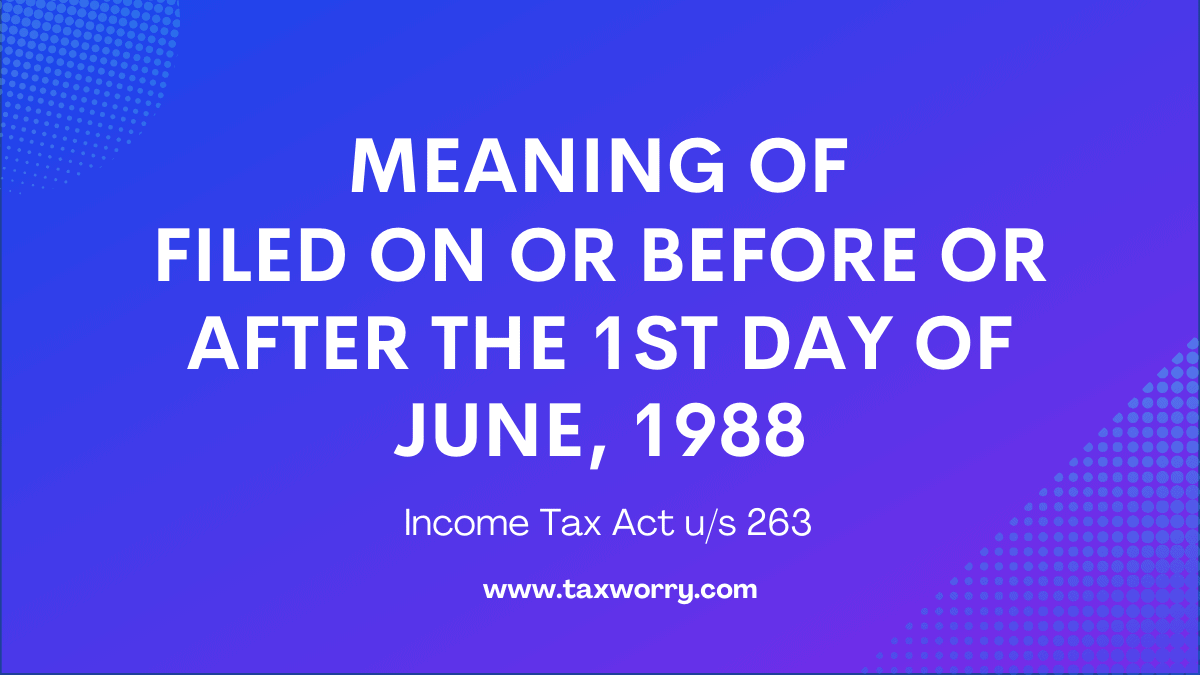Meaning of tax terms
Meaning of “Filed on or before or after the 1st day of June, 1988”
The meaning of filed on or before or after the 1st day of June 1988 under section 263 of the Income Tax Act is not defined in the act itself. But we can take guidance from decisions by various high courts. Here are excerpts of courts orders in which the Hon’ble High Court tried to explain the meaning of filed on or before or after the 1st day of June 1988.

Meaning of filed on or before or after the 1st day of June 1988
The phrase ‘filed on or before or after the 1st day of June 1988‘ used in section 263 of the Income Tax Act came up before hon’ble ITAT-Bombay in Yashodhan Industrial Investment Co. Ltd. Vs. ITO [1993] 46 ITD 80/47 TTJ 152 (BOM. – TRIB.) and it explained.
Meaning: The expression ‘filed on or before or after 1-6-1988’ refers only to the description of the appeals arising out of the orders passed by the assessing officer as a point of reference for the exercise of the power of revision under section 263.
Section 263 of Income Tax Act
Revision of orders prejudicial to revenue.
263. (1) The Principal Chief Commissioner or Chief Commissioner or Principal Commissioner] or Commissioner may call for and examine the record of any proceeding under this Act, and if he considers that any order passed therein by the Assessing Officer is erroneous in so far as it is prejudicial to the interests of the revenue, he may, after giving the assessee an opportunity of being heard and after making or causing to be made such inquiry as he deems necessary, pass such order thereon as the circumstances of the case justify, including an order enhancing or modifying the assessment, or cancelling the assessment and directing a fresh assessment.
Explanation 1.—For the removal of doubts, it is hereby declared that, for the purposes of this sub-section,—
(a) an order passed on or before or after the 1st day of June, 1988 by the Assessing Officer shall include—
(i) an order of assessment made by the Assistant Commissioner or Deputy Commissioner or the Income-tax Officer on the basis of the directions issued by the Joint Commissioner under section 144A;
(ii) an order made by the Joint Commissioner in exercise of the powers or in the performance of the functions of an Assessing Officer conferred on, or assigned to, him under the orders or directions issued by the Board or by the Principal Chief Commissioner or Chief Commissioner or Principal Director General or Director General or Principal Commissioner or Commissioner authorised by the Board in this behalf under section 120;
(b) “record” shall include and shall be deemed always to have included all records relating to any proceeding under this Act available at the time of examination by the Principal 68[Chief Commissioner or Chief Commissioner or Principal] Commissioner or Commissioner;
(c) where any order referred to in this sub-section and passed by the Assessing Officer had been the subject matter of any appeal filed on or before or after the 1st day of June, 1988, the powers of the** Principal Commissioner or Commissioner under this sub-section shall extend and shall be deemed always to have extended to such matters as had not been considered and decided in such appeal.
Explanation 2.—For the purposes of this section, it is hereby declared that an order passed by the Assessing Officer shall be deemed to be erroneous in so far as it is prejudicial to the interests of the revenue, if, in the opinion of the Principal [Chief Commissioner or Chief Commissioner or Principal] Commissioner or Commissioner,—
(a) the order is passed without making inquiries or verification which should have been made;
(b) the order is passed allowing any relief without inquiring into the claim;
(c) the order has not been made in accordance with any order, direction or instruction issued by the Board under section 119; or
(d) the order has not been passed in accordance with any decision which is prejudicial to the assessee, rendered by the jurisdictional High Court or Supreme Court in the case of the assessee or any other person.
(2) No order shall be made under sub-section (1) after the expiry of two years from the end of the financial year in which the order sought to be revised was passed.
(3) Notwithstanding anything contained in sub-section (2), an order in revision under this section may be passed at any time in the case of an order which has been passed in consequence of, or to give effect to, any finding or direction contained in an order of the Appellate Tribunal, 70[National Tax Tribunal], the High Court or the Supreme Court.
Explanation.—In computing the period of limitation for the purposes of sub-section (2), the time taken in giving an opportunity to the assessee to be reheard under the proviso to section 129 and any period during which any proceeding under this section is stayed by an order or injunction of any court shall be excluded.
In this article, you can get guidance from high courts on the meaning of filed on or before or after the 1st day of June 1988 under section 263 of the Income Tax Act.
Updated up to Finance Act 2021
